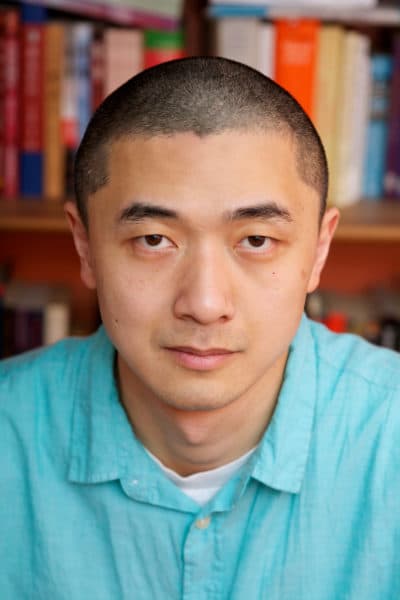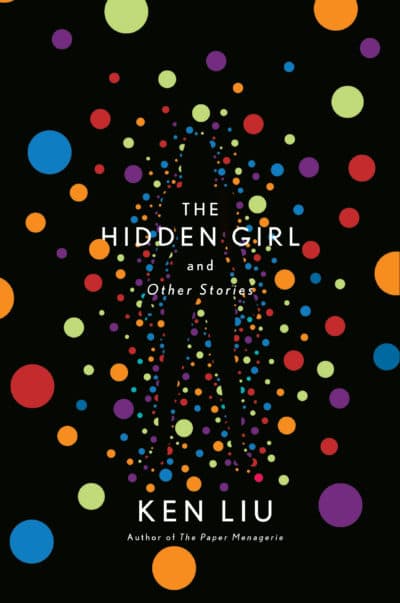Advertisement
Modern Mythmaking In Ken Liu's 'The Hidden Girl And Other Stories'
“Stories enact the values we care about as human beings,” said Ken Liu, the Nebula, Hugo and World Fantasy Award-winning author. Most people can’t process concepts like generosity, honesty, and patriotism in an abstract way, he said, so we embed those values in the heroic figures of our culture, an example being George Washington and the cherry tree as an embodiment of integrity.
The reason Liu wanted to become a writer was so he could craft stories that turn values upside down and inside out to gain new perspectives. His most recent short story collection “The Hidden Girl and Other Stories” (out Feb. 25 from Saga Press) explores ideas such as the intersection of tradition and progress, the fallibility of memory and the essence of what it means to be human.

“Life is fundamentally random, and that’s hard to accept,” said Liu, who attributes the most important decisions of his life to chance. Because he was bored by a sequencing game, he taught himself to write code to solve the puzzles faster and ended up becoming a computer programmer. Because he worked in the tech industry, he met the woman he would marry. Because he was an engineer and a lawyer in addition to being a writer, the content of his books is inevitably different than if he hadn’t also pursued those career paths. Liu said humans tend to “retroactively attribute causes and effects and create narratives for our own lives” to make sense of the randomness.
Tech, law and publishing might seem like three unrelated careers, but Liu said all three jobs required symbolic systems to construct “machines” that achieved specific results. As a computer programmer, it was a literal virtual machine; as a lawyer, he drafted contracts and briefs to create winning scenarios for his clients; and as fiction writer, he constructs narratives that take readers on an emotional journey. Readers follow rules of interpretation and storytelling conventions built up over millennia.
Tribes, cities, states and nations define themselves by “creating self, crafting meaning, making stories, and we call them ‘epics.’ They establish how they’re different from everybody else.” Liu said these foundational mythologies are a living form that reshape every generation. “Hamilton” is an apt example of scrutinizing American mythology. What is the American story and whose voices get included in the epic journey? Who has been excluded? “We speak about [traditions] as if it’s always been this way, but that’s not true. Real living tradition represents progress,” Liu said.
This argument of tradition vs. progress is illustrated in his story “Staying Behind.” The protagonist shares a memory of an indigenous woman crafting a clay pot using the same techniques passed down for generations. The protagonist’s mom believes it’s important to keep tradition alive, and his dad argues that the artist is a fossilized performer for the entertainment of tourists. This argument is magnified when humanity starts uploading their brains to the digital cloud: his mom wants her life and death to be “real,” and his dad thinks the singularity is the next logical step of human evolution. Liu doesn’t try to offer concrete answers of what’s right or wrong, he merely offers different frameworks to think about each side.
We speak about [traditions] as if it’s always been this way, but that’s not true. Real living tradition represents progress.
Ken Liu
The singularity theory exists outside of science fiction: some people believe it’s possible for humans to transfer our consciousness from the neurons in our flesh bodies to silicon processors in a computer. By doing so, our existence wouldn’t be constrained by illness, aging or even our three-dimensional plane. Consequently, we would drain fewer resources from nature by ceasing our consumption. Liu argues in favor and against the singularity in his novelette, published as a series of interconnected short stories with titles that start with “The Gods.”
But Liu thought the idea that the mind is superior to, and separable from the body is a limited understanding of our consciousness. “Our bodies regulate our mood. We feel, sense and think with our entire bodies,” he said. The more engineers create robots and artificial intelligence, the more they realize so much of what humans do is because of our embodied consciousness.

A tragic example of embodied consciousness at odds with technology is the story “Thoughts and Prayers,” where one character believes strongly in taking photographs to better preserve her memories. She says, “Our brains are so flawed, leaky sieves of time. Without pictures, so many things we want to remember would be forgotten.” But when her daughter dies in an active shooter tragedy, the pictures of her daughter she clings to so desperately are transfigured by internet trolls into something dark and twisted that overpower the “real” memories of her daughter.
Liu’s works are often labeled as science fiction or fantasy, but he does not write with genre labels in mind. His preferred writing prompt is to literalize a metaphor, and if that categorizes it as speculative fiction, so be it. “The less I cared how the stories were received, the more commercially viable they became,” Liu said. “I was extremely lucky that the stories I wanted to tell were stories people wanted to read.”
His story “The Paper Menagerie” won the Nebula Award, Hugo Award and World Fantasy Award, the first work to ever win all three. Now he has written over 100 short stories. His first attempt at writing a full-length novel turned into the epic “Dandelion Dynasty” trilogy. (An excerpt from the next in the series is included in “The Hidden Girl” collection.)
“The Reborn” short story, also part of the new collection, is an example of Liu trying to literalize something spoken about metaphorically. In this case: the idea of separating the art from the artist. In the story, the Tawnin alien species offer humans who have committed crimes the chance to be “reborn” by removing the “bad” part from their brains and erasing memories of their actions. Liu raises the question, “Are you what you do, or are you what you remember?” He also extends that metaphor to the societal level. The Tawnin slaughtered countless humans in their conquest of Earth, but they do not feel remorse because they shed their bloodthirsty personalities as if it were someone else who committed those atrocities. The Tawnin are another nation constructing their own mythology by scrubbing their war crimes from history.
The wisdom of our forbearers who did things differently are holding us up as we move forward.
Ken Liu
Liu has a deep appreciation for the living layers of history and tradition. “Modern day is deeply connected with paths layered on top of older infrastructures.” For example, internet cables run along the same lines as old railroads, which in turn were laid along former wagon trails. He explores the idea of layers literally and figuratively across the collection, and sometimes both ways at once.
In the short story “The Hidden Girl,” the protagonist Yinniang adopts Buddhist thinking when she transcends to a new plane and sees “a million billion layers to everything at once, like an ant who has always seen a line before him suddenly lifted off the page to realize the perfection of a circle.” The theme of layers also appears in “The Gods” novelette when the protagonist’s mom talks about layers of technology, and the final story of the collection, “Cutting,” where monks cut away layers of a sacred book to reveal the true story behind their faith.
“Layers allow you to appreciate so much more,” Liu said. “The wisdom of our forbearers who did things differently are holding us up as we move forward… It’s beautiful to think of what humans have accomplished, despite all the terrible things we have done to each other. Fundamentally, the direction seems to be pretty good.”
